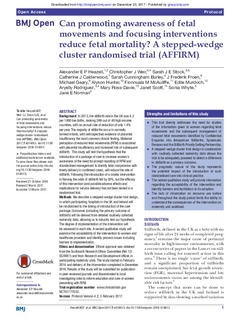Can promoting awareness of fetal movements and focusing interventions reduce fetal mortality? A stepped-wedge cluster randomised trial (AFFIRM)
Heazell, Alexander E. P.; Weir, Christopher J.; Stock, Sarah J. E.; Burley, Sarah Cunningham; Frøen, Frederik; Geary, Michael J.; Hunter, Alyson; McAuliffe, Fionnuala M.; Murdoch, Edile; Rodriguez, Aryelly; Ross-Davie, Mary; Scott, Janet; Whyte, Sonia; Normans, Jane E.
Peer reviewed, Journal article
Published version
Permanent lenke
http://hdl.handle.net/11250/2507565Utgivelsesdato
2017Metadata
Vis full innførselSamlinger
- Artikler [5061]
- Publikasjoner fra CRIStin FHI [7531]
Sammendrag
Background In 2013, the stillbirth rate in the UK was 4.2 per 1000 live births, ranking 24th out of 49 high-income countries, with an annual rate of reduction of only 1.4% per year. The majority of stillbirths occur in normally formed infants, with (retrospective) evidence of placental insufficiency the most common clinical finding. Maternal perception of reduced fetal movements (RFM) is associated with placental insufficiency and increased risk of subsequent stillbirth. This study will test the hypothesis that the introduction of a package of care to increase women's awareness of the need for prompt reporting of RFM and standardised management to identify fetal compromise with timely delivery in confirmed cases, will reduce the rate of stillbirth. Following the introduction of a similar intervention in Norway the odds of stillbirth fell by 30%, but the efficacy of this intervention (and possible adverse effects and implications for service delivery) has not been tested in a randomised trial. Methods We describe a stepped-wedge cluster trial design, in which participating hospitals in the UK and Ireland will be randomised to the timing of introduction of the care package. Outcomes (including the primary outcome of stillbirth) will be derived from detailed routinely collected maternity data, allowing us to robustly test our hypothesis. The degree of implementation of the intervention will be assessed in each site. A nested qualitative study will examine the acceptability of the intervention to women and healthcare providers and identify process issues including barriers to implementation. Ethics and dissemination Ethical approval was obtained from the Scotland A Research Ethics Committee (Ref 13/SS/0001) and from Research and Development offices in participating maternity units. The study started in February 2014 and delivery of the intervention completed in December 2016. Results of the study will be submitted for publication in peer-reviewed journals and disseminated to local investigating sites to inform education and care of women presenting with RFM.
